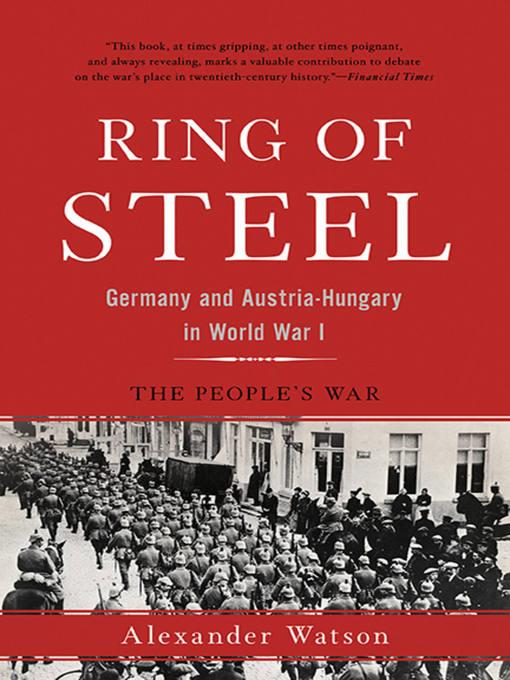
Ring of Steel
Germany and Austria-Hungary in World War I
- اطلاعات
- نقد و بررسی
- دیدگاه کاربران
نقد و بررسی

August 18, 2014
University of London historian Watson (Enduring the Great War) makes a major contribution to the ever-growing historiography of WWI with this comprehensive analysis of the war efforts of the primary Central Powers: Germany and Austria-Hungary. Watson makes a strong case that “fear, not aggression or unrestrained militarism” impelled them to war in 1914. Fear fueled the unexpected popular consent that sustained both Hohenzollern and Habsburg empires in a “war of illusions” that devolved into a “war of defense” and finally into a war for survival. From the beginning, the Central Powers were overmatched and overextended. They answered the resulting “desperation and alienation” with failed policies of “compulsion and control,” a series of disastrously bad policy decisions such as the U-boat war, and a doubling-down on autocracy and repression at the expense of peace and reform. In 1917, both empires suffered from a deep “crisis of legitimacy”: only the possibility of “quick and total victory” sustained the foundering alliance. A series of desperate offensives produced military, political, and above all social collapse. Watson concludes that the “suffering, and the jealousies, prejudices, and violence that spawned or exacerbated” in Central Europe laid the foundations of WWII far more than anything decided at Versailles.

August 15, 2014
A British historian examines the desperate ethnic divisions roiling the Austro-Hungarian Empire that both propelled it to war in 1914 and undermined its success. From the first decision to go to war after the assassination of Archduke Franz Ferdinand to the peace signed in Versailles in June 1919, Watson (History/Univ. of London; Enduring the Great War: Combat, Morale and Collapse in the German and British Armies, 1914-1918, 2008) sifts carefully through the thinking and actions of the main Central Powers, the Habsburgs and the Germans, in provoking a European conflagration against enemies of superior numbers and military might (the Russians, British and French). Punishing Serbia for the assassinations meant bringing in its powerful ally Russia, but Watson argues that the sprawling multiethnic Austria-Hungary had largely lost control of its nationalist pockets and feared a "domino effect" if this insurgency was not violently crushed. Indeed, the empire's dangerously paranoid statesmen promoted war out of "a profound sense of weakness, fear and even despair." Germany was also operating from a place of deep insecurity regarding France, Russia and Britain, and Watson shows how Chief of the German General Staff Helmuth von Moltke was rather more "defensive and reactive" than saber-rattling. Thus the Central Powers were able to sell the war to the people as a defensive action, surrounded as they were by hostile enemies-"a ring of steel." The "pervasive sense of threat" to the community translated initially into a patriotic spur to mobilization, but it morphed into suspicion and vigilantism as refugees from the eastern war zones of Galicia flooded into the interior and provoked ethnic hostilities and anti-Semitism. The German atrocities in Belgium and Russians' in Galicia, the Ottomans' treatment of the Armenians and the ultimate claim that "security" was the German Reich's ultimate goal-all of this paved the way for Nazi genocide. For World War I and modern European history enthusiasts, this is a comprehensive work that ably conveys the disintegration of empire.
COPYRIGHT(2014) Kirkus Reviews, ALL RIGHTS RESERVED.

Starred review from October 1, 2014
Watson (history, Univ. of London; Enduring the Great War) tells the story of World War I from the perspectives of Austria and Germany. He examines the political causes and goals of the war, popular support for the battle in Germany and Austria-Hungary, and moral culpability for atrocities committed during the war. His tone is especially sympathetic to Germany, while maintaining some criticism of Austria-Hungary. However, there is heavy criticism of Russia for turning what could have been a localized Balkan conflict into a worldwide conflagration and for brutalities carried out by the tsar's military and government. Watson's descriptions of civilian conditions during the war also bring into question the morality of Britain's blockade of the Central Powers. (France and Turkey are noticeably absent in his analysis.) The evidence is persuasively presented, especially since Watson fairly handles alternative views. VERDICT This account is an excellent contrast to recent books that have emphasized German culpability and brutality such as Max Hastings's Catastrophe 1914. In a centennial anniversary crowded with titles on World War I, Watson's book stands out and will appeal both to readers with a casual interest in the history of the Great War and to specialists seeking a balanced and nuanced view of the event.--Michael Farrell, Reformed Theological Seminary, Orlando, FL
Copyright 2014 Library Journal, LLC Used with permission.




دیدگاه کاربران